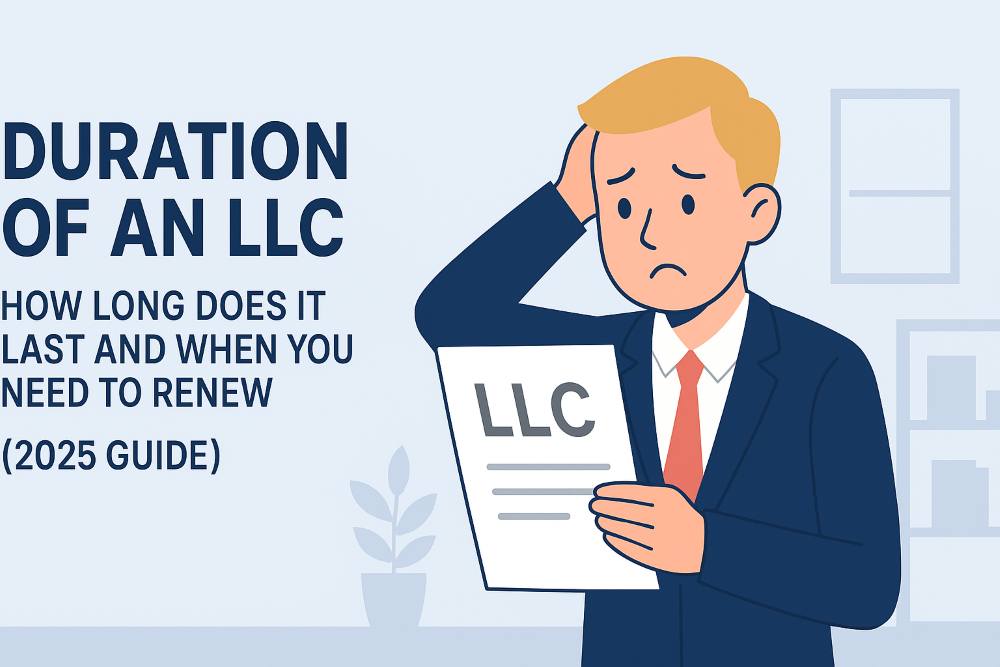When forming a Limited Liability Company (LLC), one key aspect business owners often overlook is the duration of the entity. How long does an LLC remain active? Does it expire after a few years, or can it last indefinitely?
This article explains how LLC duration works, what determines its lifespan, and how to ensure your business remains compliant and active under U.S. law in 2025.

How the Duration of an LLC Is Defined
When you file your Articles of Organization, you must indicate whether your LLC is perpetual or has a specific duration.
- Perpetual Duration: Most LLCs fall into this category, meaning they continue to exist indefinitely until members decide to dissolve it.
- Specific Duration: Some LLCs are created for temporary projects, such as real estate developments or joint ventures, and are automatically dissolved after a set time.
To learn more about how LLC duration is recorded at the time of formation, check our in-depth guide here:
👉 Understanding the Duration of an LLC: How Long an LLC Remains Active in the U.S.
Does an LLC Ever Expire?
In general, an LLC does not expire automatically, but it can become inactive for several reasons:
- Failure to file annual reports or renewal documents
- Non-payment of required state fees or taxes
- Member decision to dissolve the company
- Administrative dissolution by the state for non-compliance
If your LLC becomes inactive, you’ll need to reinstated it through your state’s Secretary of State office.
For example, you can review official state rules here:
Annual Renewal and Compliance Requirements
Each state has its own renewal process, usually involving:
- Filing an Annual Report
- Paying an Annual Fee
- Maintaining a Registered Agent
Missing these steps can result in suspension or dissolution of your LLC.
You can verify your state’s exact renewal deadlines by visiting the U.S. Small Business Administration (SBA.gov).
How to Keep Your LLC Active for Years
To ensure your LLC continues to operate legally and maintain its protections, follow these steps:
- Stay compliant with your state filing deadlines.
- Keep your business license current and renew it when necessary.
- Update your Operating Agreement whenever ownership or management changes.
- File taxes on time and maintain separate business finances to preserve liability protection.
For more information about federal tax obligations, visit IRS.gov.
When Should You Dissolve an LLC?
Even if your LLC is perpetual, there may come a time when it’s no longer needed — for example, if the project ends or members want to close the business.
Voluntary dissolution can be filed online in most states, typically through the Secretary of State’s website.
Before closing your LLC, make sure to:
- File a final tax return with the IRS.
- Notify your state and pay outstanding fees.
- Cancel business licenses and permits.
FAQs
Q: What is the typical duration of an LLC?
A: Most LLCs are perpetual unless you specify otherwise in the Articles of Organization.
Q: Do I need to renew my LLC every year?
A: Yes, through your state’s annual report and renewal fee process.
Q: Can an inactive LLC be reactivated?
A: Yes, most states allow reinstatement if you pay overdue fees and file missing reports.
Final Thoughts
An LLC’s duration depends on how it’s established and how well you maintain compliance.
With the right management and timely renewals, your LLC can operate indefinitely — providing long-term legal protection and business stability.
If you’re forming a new LLC or managing an existing one, understanding duration and renewal rules is key to avoiding costly administrative issues.